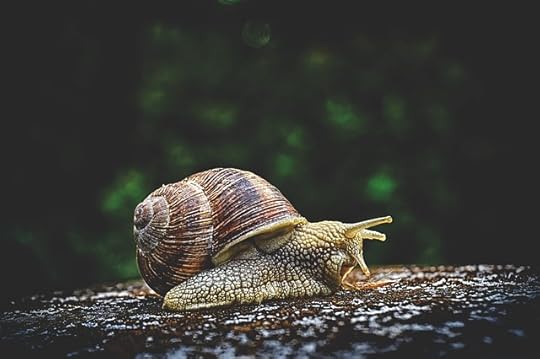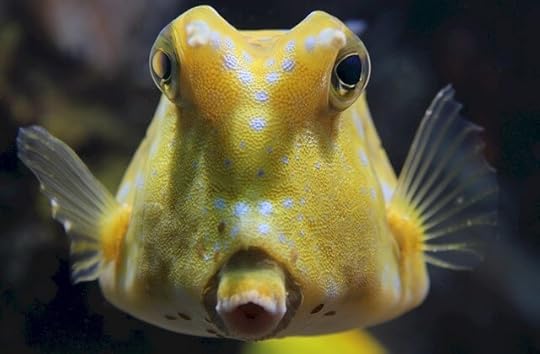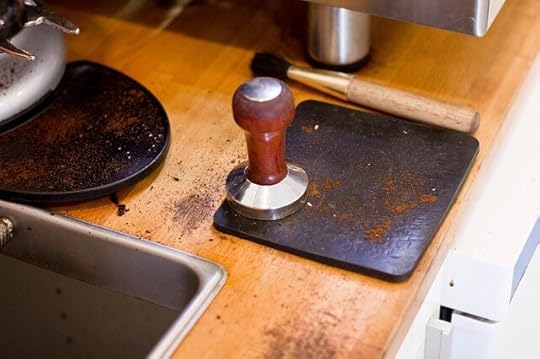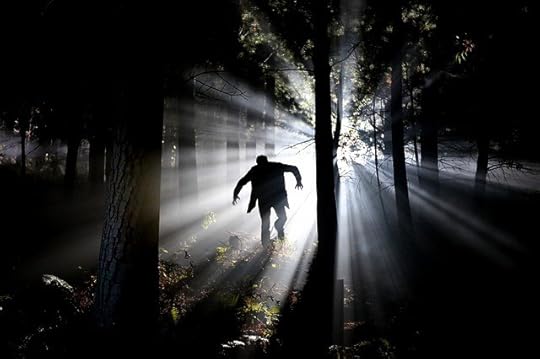Kris Spisak's Blog, page 16
November 13, 2018
Episode 10: “Prouder” or “More Proud” than a Peacock? (Plus a Spelling Meme Debunked)

 Is it possible to be more proud than a peacock? Or, wait, is it “prouder” than a peacock? One is the correct form, but do you know the answer?
Is it possible to be more proud than a peacock? Or, wait, is it “prouder” than a peacock? One is the correct form, but do you know the answer?
Let’s talk language tips for the curious or confused. This is Season 1, Episode 10. How we have only two episodes left in this first season, I have no idea, but here we are.
I’m presently building my list of ideas for Season 2, so contact me if you have a question or some fascinating word trivia to share. But for now, let’s dive in.
Episode 10: “Prouder” or “More Proud” than a Peacock? (Plus a Spelling Meme Debunked)
Approximate transcript:

Is it possible to be more proud than a peacock?
If your mom has ever told you she couldn’t be more proud, maybe she said it because it was true. But before you start feeling all the warm fuzzies, maybe it was just a matter of linguistics. “More proud” isn’t really a thing. She couldn’t be “more proud,” because that combination of words isn’t technically correct.
I feel like I might have just broken some hearts. Don’t worry. I’m sure your mom couldn’t be prouder of you. (That’s the correct form of the sentiment.)
When it comes to superlatives, sometimes it’s tricky when deciding which words get “–er” or “-est” endings and which words get “more” or “most” placed in front of them. As with most things in the English language, there’s an easy rule for knowing the difference; unsurprisingly, there are also a lot of exceptions to the easy rule—but we’ll worry about that later.
Superlative rule #1 – If the adjective you’re using has one syllable, use the “-er” and “-est” suffixes (e.g., “proud,” “prouder,” “proudest”; “high,” “higher,” “highest”; or “thick,” “thicker,” “thickest”).
Superlative rule #2 – If the adjective you’re using has three or more syllables, always use “more” or “most” in front of the word (e.g., “terrified,” “more terrified,” “most terrified”; “intelligent,” “more intelligent,” “most intelligent”; “confusing,” “more confusing,” “most confusing”).
You’ll notice a major gap in these rules, and I bet you can already think of a few exceptions. “But what about the two syllable words?” I hear you saying. And what about “good,” “better,” “best”?
I know, I know… the English language is one of rebellion, and there are always exceptions to rules. However, knowing the rule in the first place gives you a good start. (If it helps, for those two-syllable adjectives, there is a secondary rule concerning the final letters of the word, which is mostly followed, but we’ll get into that another day.)
To get back to the original debate, “proud” is one syllable. Thus, “prouder” is the correct form. This single-syllable adjective often seems to have more confusion than others, but technically, “prouder” is correct.
You don’t have to correct your mom, but if you’re saying it to your own kids—or dogs or peacocks—make sure you get it right.
And speaking of exceptions to rules…
[image error]Recently, a challenge was thrown down from one of you. And you know me; I can’t ignore a good writing dispute. It’s like a double-dog dare in the school yard–just switch out the bold kid with me sitting at my computer, glasses on, jaw steeled with determination. (An intimidating picture, I know)
The claim states, “There are 923 words that break the ‘i’ before ‘e’ rule. Only 44 words actually follow that rule.”
For the sake of a writing tip, let’s take a moment to get into the nitty gritty fine print that this statement ignores. The “i” before “e” except after “c” rule applies only to words where the “ie” makes the “ee” sound (e.g. “achieve,” “piece,” “belief,” “receive,” “ceiling,” “receipt,” etc.). Some spelling textbooks even record this as part of the rhyme:
I before E except after C,
When the sound is “ee”
With this clarification, many of the aforementioned 923 words become less defiant.
Words like “science” or “efficient” – where the “i” follows the “c” – have a different sound.
Words like “beige,” “neighbor,” “height” and “weight” – with their rebellious “ei” form not following a “c” – also break the rule, but their vowel combination sound is also not an “ee.”
There continue to be exceptions, though. If you really want to get technical, you can learn the specific categories where the “ei” is correct when it makes the “ee” sound, even when it doesn’t follow a “c”:
Proper names, such as “Keith” or “Sheila”;
Chemical names, such as “caffeine”;
Plural forms of words that end in “-cy,” such as “tendencies”
No, this list doesn’t cover them all. Keep in mind the challenge wasn’t to break this down in an understandable manner.
Let’s return to that challenge. I indeed solved it. The total of 923 words that break the rule is incorrect. It’s actually more. (Didn’t see that one coming, did you?) QI, a quiz show on BBC, reported the 923 figure as determined by Scrabble experts, but this is the number of words that end in “-cie.” Add in all of the “e” before “i” words that don’t follow a “c” and you’ve got yourself an even more striking number. What that number is, I don’t know, but I’m sure it’s impressive.
So there you go, shocking grammar meme debunked. As for the “i” before “e” rule… it’s catchy but it might not be as helpful as we thought it was in elementary school.
The English language is tricky. It takes time to get it right. But you, dear listener, are well on your way. And for that, I’ll say, I couldn’t be prouder.
Join 750+ subscribers and sign-up for my writing and editing email newsletter for more tips like this.
And don’t forget to subscribe to this podcast (via Apple Podcasts, Android, Google Podcasts, Stitcher, or RSS) so you’ll never miss out on another word you should know. Like what you heard? Rate my show on iTunes or wherever you listen.
Contact me today if you have any language questions for a future episode. I’d love to hear from you!
The post Episode 10: “Prouder” or “More Proud” than a Peacock? (Plus a Spelling Meme Debunked) appeared first on Kris Spisak.
November 9, 2018
Writing Tip 365: “Exasperate” vs. “Exacerbate”

 You know who’s exasperated? A snail moving uphill. The morning dew only exacerbates the journey.
You know who’s exasperated? A snail moving uphill. The morning dew only exacerbates the journey.
Oh, English language, there you go again with words that are so similar that confusion reigns once again.
Remember:
“To exasperate” is to annoy, irritate, or greatly bother.
“To exacerbate” is to worsen, to make more severe.
Thus:
“Exasperation” is aggravation or overwhelming annoyance.
“Exacerbation” is the worsening, or the heightened severity.
Pouring salt on a wound might exacerbate the pain, but you know what? Don’t mention that salt to the snail. He might become even further exasperated. And no one likes a panicked snail.
Join 750+ subscribers and sign-up for my writing and editing email newsletter for more tips like this.
The post Writing Tip 365: “Exasperate” vs. “Exacerbate” appeared first on Kris Spisak.
November 6, 2018
Episode 9: Cowboy Slang and Ace-High Wild West Typos


Language tips for the curious or confused. Because we really can fit into either category, depending on the day, the moment, the answer that slipped from your mind.
This is episode 9 of season 1, and I’ll admit it, this podcast started out as an experiment. Who in the world is as fascinated as I am by words and language and fine-tuning our communications, spit-polishing them until them shine? It turns out, I’m not alone. I love it.
But let’s dive in. Or should I say, let’s giddy-up. Today, we’re talking about cowboys.
Episode 9: Cowboy Slang and Ace-High Wild West Typos
Approximate transcript:
We’re getting there through a conversation about how to spell “faze” vs. “phase.” When something fazes/phases you, like a wayward cow who’s left the herd, or like perhaps bad spelling, how do you spell that?
 What? Are you doing a double-take? Did you realize there’s this other word “faze” that you should be aware of? Yep, pay attention to your spelling, folks. The “phase” vs. “faze” distinction is one you should definitely know.
What? Are you doing a double-take? Did you realize there’s this other word “faze” that you should be aware of? Yep, pay attention to your spelling, folks. The “phase” vs. “faze” distinction is one you should definitely know.
A lot of people assume that the “phase” spelling covers everything. It might not have fazed you, but it’s fazed a lot of editors over time.
Remember:
“Phase” is either a verb, meaning to carry out systematically (i.e., “phase in” or “phase out”), or a noun, meaning a stage (e.g., the phases of the moon).
“Faze” is a verb meaning to disturb or embarrass. It commonly appears in its negative form, “unfazed.”
Interestingly, the word “faze” is a 19th-century American invention, stemming from the word “feeze,” which meant to drive away or to frighten. Here we have another tale of a word that has been all but forgotten, but in this case, the slang variant born out of the American Wild West—”faze”—is still going strong. I don’t know the cowboy or cowgirl who started it all, but it’s surely an ace-high grammarian tale.
Cowboy slang. Howdy, language innovation.
As a bonus here, do you know how to spell “y’all”?

Everyone has their version of the South. Here’s mine. Wow, do I miss the mountains this time of year.
When people misspell the contraction “y’all,” I can’t help but cringe. Sure, it may be the same way others cringe upon hearing the southern colloquialism, but I can’t help it. It’s not a creation of an invented dialect. It’s a contraction, people. A contraction. As in one word that combines two others.
Is not –> Isn’t
They will –> They’ll
I have–> I’ve
It is –> ‘tis (Yes, I’m a Shakespeare fan too)
You all –> Y’all
What is with this “ya’ll” form I keep seeing? Is this some form of Yankee trickery, trying to transfigure a celebrated Southern idiom into a nonsensical, Red Neck Comedy Tour inspired tomfoolery? I protest, y’all. I utterly and whole-heartedly protest.
And since we’re on a roll, I’ll give you one more.

Psst. This is the place you’re looking for.
If you want to go dive in a corral reef, I wonder if you’ve drank a bit too much tarantula juice after a long day lassoing cows and singing cowboy songs. Don’t dive in the corral. It’ll probably hurt, and there might just be a bull in there that will add to the misadventure.
“Corrals” go with cowboys. Cowboys are often in groups (plural), so the “R”s are too.
Remember:
A “corral” is a gathering pen for horses, cows, or similar animals. It can also be a verb meaning to gather or to seize.
“Coral,” on the other hand, is that lovely reef you’re looking for. They’re pretty rare, so maybe that’s why there’s only one “R” in there. “Coral” is also maybe the shade your face turns when you mix up these two words—a redish, pinkish, yellowish hue.
I caught this “coral” vs. “corral” typo the other day, and it made me smile. You know what else makes me smile? Tarantula juice. No, not the drinking of it—though that would surely also make me smile—but the fact that this cowboy slang for whiskey exists.
Who knew talking about cowboys could cover so much about the proper use of the English language?
Join 750+ subscribers and sign-up for my writing and editing email newsletter for more tips like this.
And don’t forget to subscribe to this podcast (via Apple Podcasts, Android, Google Podcasts, Stitcher, or RSS) so you’ll never miss out on another word you should know. Like what you heard? Rate my show on iTunes or wherever you listen.
Contact me today if you have any language questions for a future episode. I’d love to hear from you!
The post Episode 9: Cowboy Slang and Ace-High Wild West Typos appeared first on Kris Spisak.
November 2, 2018
Writing Tip 364: “Bleary” vs. “Blurry”

 Was the band Puddle of Mudd bleary when they sang, “Everything’s so blurry”?
Was the band Puddle of Mudd bleary when they sang, “Everything’s so blurry”?
Bleary-eyed. Blurry vision. I know they’re close, but these two words are not one and the same.
I can’t “take it all away.”
I’m not “shoving it in your face.”
But let me “explain again to [you].”
Oh, Puddle of Mudd, I know you’re not singing about this word confusion, but for a moment, I’m going to pretend that you are.
If you’re bleary, all of these word choice rules can seem hard to manage, but honestly, when you’re not bleary, it can seem just as difficult.
Remember:
“Blurry” means unclear, unfocused, or hazy.
“Bleary” means very tired. Yes, it can also mean dull or dimmed vision, but this usually is due to a specific cause of exhaustion.
Other things might be blurry, as in out of focus. It can be true through a camera lens, through a fogged window, or when your eyes aren’t quite awake. A photograph might be blurry too.
You might be bleary, as in exhausted or feeling bleary-eyed. Your friend who had a bit too much to drink last night (while listening to Piddle of Mudd?) might look a bit bleary. If they look a bit blurry, then you have an entirely different Back-to-the-Future, disappearing Michael J. Fox issue going on.
Thus, Puddle of Mudd sings “Everything’s so blurry,” and I feel their pain. Well, almost, I suppose.
The “blurry” vs. “bleary” question comes up because these words are close, indeed, but they aren’t always synonymous.
Digging into their history makes me feel a bit bleary though. Listening to Puddle of Mudd does kind of fit these moments.
“Bleary” has been in use since the late 14th century, coming from a tweaked version of “blear.” “Blear” dates back to the 13th century and as an adjective meant “to dim or make hazy from tears or wet eyes.” Thus, “to be bleary” means that you could possibly have blurry vision.
“Blurry” on the other hand is a relatively recent word, first used in the mid 19th century, coming from “blur,” originally meaning “a smear on a paper or other writing surface.” This early form of “blur” also could mean, “a moral stain” in the 16th century.
Both “bleary” and “blurry” seem to have a similar root in the Middle English word bleren, but having a similar root doesn’t mean that they are the same word.
If you read dictionaries for too many hours, the words might start to go blurry. You might feel bleary-eyed. Maybe it’s time to put on an old Puddle of Mudd CD and call it a day.
Join 750+ subscribers and sign-up for my writing and editing email newsletter for more tips like this.
The post Writing Tip 364: “Bleary” vs. “Blurry” appeared first on Kris Spisak.
October 29, 2018
Episode 8: To “Sure Up” or “Shore Up” Your Sandcastles


We all need these little word choice reminders, don’t we?
We need to remember the difference between “insure” and “ensure,” without a doubt understanding that “insure” with an “i” is talking about insurance.
We need to know that when you might say “I could care less,” that means that you do indeed care about something. If you say, “I could care less,” then you must care a bit to be able to care a smaller amount. The expression you might be looking for is “I couldn’t care less,” which means that you already care so little that it’s impossible for you to care less than you already do. There’s a difference.
Our words have the power to meddle or to muddle if we don’t pay attention to them.
But without further ado, here’s today’s writing tip for the curious or confused.
Episode 8: To “Sure Up” or “Shore Up” Your Sandcastles
Approximate transcript:
I just might be catching you using a phrase that doesn’t actually exist with this one. Think fast. Which one is correct? “Shore up” or “sure up”?

Psst… here’s your hint
When a plan at work needs some extra strategic support, when your offensive line has some major gaps, or when your sandcastle is falling down, what do you need to do?
I almost hate to break it to you, but:
the correct phrase is “shore up” not “sure up.”
This expression first appeared a long, long time ago—somewhere between 1300-1500—when the word “shore” was not only a place where the land met the sea or the place where she sells seashells. “Shore” had and has another definition that has fallen out of favor: a support beam, prop, or buttress. This word comes from the Middle Low German schore. Interestingly, this root is different from “shore” as in seashore, which comes from the Middle Low German schor. Confusing? Absolutely, but that’s not the issue at stake here.
The mistake of writing “sure up” instead of “shore up” is common. You find it in news articles, books, and almost anywhere written text is found. And there’s a logic there even. You want to make something “sure” as in certain or unfailing. I hear you, but it just isn’t so.
Sure, “sure” might have logic, but since when has logic stopped the English language? “Sure up” is the syntactic impostor.
Don’t believe me? Maybe it will help that Merriam Webster, Oxford Dictionaries, and Dictionary.com all don’t recognize “sure up” as an existing phrase. It’s true. Feel free to fact-check this one for yourself.
Happy writing, everyone!
Join 700+ subscribers and sign-up for my writing and editing email newsletter for more tips like this.
And don’t forget to subscribe to this podcast (via Apple Podcasts, Android, Google Podcasts, Stitcher, or RSS) so you’ll never miss out on another word you should know. Like what you heard? Rate my show on iTunes or wherever you listen.
Contact me today if you have any language questions for a future episode. I’d love to hear from you!
The post Episode 8: To “Sure Up” or “Shore Up” Your Sandcastles appeared first on Kris Spisak.
October 25, 2018
Writing Tip 363: “Dive in” vs. “Delve in”


It’s not as simple as dirt versus water, but if that helps you figure it out, let’s begin this “dive in” vs. “delve in” conversation there. This guy knows what I mean.
If you’re looking forward to “diving in,” this is different from looking forward to “delving in.” One involves shovels and/or deep exploration. One involves an enthusiastic move forward and maybe even aquatic life.
Remember:
“To dive in” means not only to plunge head-first into water, but also to move forward into a project or activity. There are other meanings of “to dive,” of course, but these are the two I want to focus on for the moment.
“To delve in” means to dig in, whether with a spade into dirt (the original version of the word in 9th century Old English) or whether more abstractly (a more recent meaning), with an inquisitive mind, analyzing something or searching for further information.
If you’re jumping enthusiastically into a work project, maybe you’re diving in. If you’re starting some research or some deeper examination or analysis of some kind, you’re more likely delving in.
If you’re giddy about your first scuba lesson, maybe you’re ready to dive in on multiple levels. There are schools and shoals of fish to see, after all! Of course, if you’re working on your scuba certification, perhaps you’re delving into the subject matter of buoyancy control and underwater communication signs.
Underwater adventures aside, my favorite use of “delve” that sometimes confuses people is in a nursery rhyme that’s probably familiar to you.
“One, two, buckle my shoe” (The lack of shoe buckles aside, we’re doing well so far.)
“Three, four, close the door” (Or is it “knock at the door”? “Shut the door”? Beside the point, really.)
“Five, six, pick up sticks” (I think we can all agree on that one.)
But when you get all the way past ten, there’s, “Eleven, twelve, dig and delve.”
Here’s the problem, you might say. (Though is it really a problem?)
How is “digging” different from “delving”? According to Merriam Webster, in an earlier era, “digging” sometimes referred to working with a specific set of tools that were different from the shovel that “delving” requires. So the nursery rhyme does actually work, whether you knew that verse or not.
Feel free to use it as a countdown before diving into the ocean if you’d like, of course.
Any other “digging,” “diving,” “delving” questions? You know I’ve got to say it: If you’re ready to delve into more English language specifics, there’s always Get a Grip on Your Grammar.
Happy writing, researching, and swimming, everyone!
Join 700+ subscribers and sign-up for my writing and editing email newsletter for more tips like this.
The post Writing Tip 363: “Dive in” vs. “Delve in” appeared first on Kris Spisak.
October 23, 2018
Episode 7: Harry Potter and the Trickery of Spacing (“One-Time” vs. “Onetime” vs. “One Time”)


Before I dive into the trickery of English language spacing, let me tell you a story about selling books at midnight at the launch of J.K. Rowling’s 5th book in the Harry Potter series, The Order of the Phoenix.
I was in college at the time, working at a bookstore, and the build-up had been growing for weeks. Pre-orders were organized. Boxes were piled up in the back. Everyone working that night had to don at minimum a cape. The one I was given was purple and sparkly. If you know me, you’ll know that purple sparkly capes are not quite my style, but these are the things we do for the love of books and the love of readers.
Episode 7: Harry Potter and the Trickery of Spacing (“One-Time” vs. “Onetime” vs. “One Time”)
Approximate transcript:
At midnight, a massive man, Hagrid—I’m still pretty sure he was the actual Hagrid—rolled up into the strip mall parking lot on a motorcycle. His beard hung low. His hair was wild. His capes and animal skins hung off of him proving his expertise of magical creatures. I might have been as entranced as the no-longer sleepy-eyed children queued up outside the bookshop’s doors.
Books are magic. Books about magic are definitely magic. This one time in my life etched that into my being.
But let’s get back to today’s quest into the trickery of spacing.

I might not be a fan of birds, but this one looks pretty darn wise. He knows something, doesn’t he? I bet he understands the differences between these spellings.
Once upon a time, you thought language was simple, didn’t you? Then came the moment you started to over-think the differences between “onetime” vs. “one time” vs. “one-time”—and your boggled mind hasn’t been the same since.
I jest… but then, maybe I don’t. These are the subtleties that catch us and take our writing back a step.
Remember:
“Onetime” is an adjective, meaning former, as in “a onetime addict to Harry Potter.”
“One time” (two separate words) is an adjective and a noun, meaning a single occasion, as in, “One time, I wore a purple sparkling cape because my bookstore employer dictated it on the night of a Harry Potter midnight release.”
“One-time” is an adjective, meaning happening only once, as in, “I’m pretty sure pretend Hagrid riding up on his motorcycle at the strip mall was a one-time occasion.”
Admittedly, the difference between “onetime” and “one-time” seems to be a recent development, with many dictionaries (especially those outside of North America) not yet making a distinction between the two. Will this new rule hold? Only time will tell.
A single space, a hyphen, a combined word—Harry Potter book-selling memories aside, the distinctions aren’t matters of wizardly trickery. Only English language trickery.
Does that make it easier to deal with? Perhaps not. But the good news is that you don’t need a magic wand to conquer it once and for all.
Join 700+ subscribers and sign-up for my writing and editing email newsletter for more tips like this.
And don’t forget to subscribe to this podcast (via Apple Podcasts, Android, Google Podcasts, Stitcher, or RSS) so you’ll never miss out on another word you should know. Like what you heard? Rate my show on iTunes or wherever you listen.
Contact me today if you have any language questions for a future episode. I’d love to hear from you!
The post Episode 7: Harry Potter and the Trickery of Spacing (“One-Time” vs. “Onetime” vs. “One Time”) appeared first on Kris Spisak.
Episode 7: Harry Pottery and the Trickery of Spacing (“One-Time” vs. “Onetime” vs. “One Time”)


Before I dive into the trickery of English language spacing, let me tell you a story about selling books at midnight at the launch of J.K. Rowling’s 5th book in the Harry Potter series, The Order of the Phoenix.
I was in college at the time, working at a bookstore, and the build-up had been growing for weeks. Pre-orders were organized. Boxes were piled up in the back. Everyone working that night had to don at minimum a cape. The one I was given was purple and sparkly. If you know me, you’ll know that purple sparkly capes are not quite my style, but these are the things we do for the love of books and the love of readers.
Episode 7: Harry Pottery and the Trickery of Spacing (“One-Time” vs. “Onetime” vs. “One Time”)
Approximate transcript:
At midnight, a massive man, Hagrid—I’m still pretty sure he was the actual Hagrid—rolled up into the strip mall parking lot on a motorcycle. His beard hung low. His hair was wild. His capes and animal skins hung off of him proving his expertise of magical creatures. I might have been as entranced as the no-longer sleepy-eyed children queued up outside the bookshop’s doors.
Books are magic. Books about magic are definitely magic. This one time in my life etched that into my being.
But let’s get back to today’s quest into the trickery of spacing.

I might not be a fan of birds, but this one looks pretty darn wise. He knows something, doesn’t he? I bet he understands the differences between these spellings.
Once upon a time, you thought language was simple, didn’t you? Then came the moment you started to over-think the differences between “onetime” vs. “one time” vs. “one-time”—and your boggled mind hasn’t been the same since.
I jest… but then, maybe I don’t. These are the subtleties that catch us and take our writing back a step.
Remember:
“Onetime” is an adjective, meaning former, as in “a onetime addict to Harry Potter.”
“One time” (two separate words) is an adjective and a noun, meaning a single occasion, as in, “One time, I wore a purple sparkling cape because my bookstore employer dictated it on the night of a Harry Potter midnight release.”
“One-time” is an adjective, meaning happening only once, as in, “I’m pretty sure pretend Hagrid riding up on his motorcycle at the strip mall was a one-time occasion.”
Admittedly, the difference between “onetime” and “one-time” seems to be a recent development, with many dictionaries (especially those outside of North America) not yet making a distinction between the two. Will this new rule hold? Only time will tell.
A single space, a hyphen, a combined word—Harry Potter book-selling memories aside, the distinctions aren’t matters of wizardly trickery. Only English language trickery.
Does that make it easier to deal with? Perhaps not. But the good news is that you don’t need a magic wand to conquer it once and for all.
Join 700+ subscribers and sign-up for my writing and editing email newsletter for more tips like this.
And don’t forget to subscribe to this podcast (via Apple Podcasts, Android, Google Podcasts, Stitcher, or RSS) so you’ll never miss out on another word you should know. Like what you heard? Rate my show on iTunes or wherever you listen.
Contact me today if you have any language questions for a future episode. I’d love to hear from you!
The post Episode 7: Harry Pottery and the Trickery of Spacing (“One-Time” vs. “Onetime” vs. “One Time”) appeared first on Kris Spisak.
October 18, 2018
Writing Tip 362: “Tamp down” vs. “Tap down”


Rumors are flying, so what do you do? Do you tamp them down or tap them down? If a business strategy isn’t quite working, are profits tamped down or tapped down?

Baristas might be familiar with a different type of “tamp,” but yes, that version plays into this word history confusion too.
Sure, you think trouble might come from uppercuts and jabs, but here’s a case when gentle tapping (or should I say, “tamping”?) causes the biggest blows—at least in terms of correct word choice.
There’s tapping on the shoulder, and there’s tamping of your coffee beans. It’s time we knew the difference.
Remember:
“Tamping down” means to reduce or lesson, to put a check on. It can also mean to push downward by repeated soft blows. It’s this latter definition where the confusion seems to set in.
“Tapping” has many meanings, but for the sake of this conversation, let’s just talk about its definition related to light beating or striking. “Tapping down” might be the proper wording if you are hammering a nail, but it’s not the intended word choice for all situations.
“Tapping” had its first use in the 13th century. “Tamping” as a verb, goes back to the 19th century. Clearly, one of these words has major linguistic seniority, and maybe that’s why so often people refer to “tapping down” the effects of something.
However, this isn’t the end of the story. Maybe you’ve already spotted the hole in this conversation. What about “damp down”? Where does that phrase come in? Well, I’m so glad you asked. (Or I’m so glad I imagined you did.)
It’s in the “tamp down” vs. “damp down” conversation that we find another linguistic hijacking.
The word “damp” actually has a fascinating history all on its own, with early meanings as a verb including “to choke” or “to deaden” before we reach today’s common adjective form definition of being slightly wet. But it was in the 1800s when “to damp down” picked up a new popular meaning, specifically “to dull” or “to lessen the effects of” something.
When “tamp” came to be in the 1800s, it was a verb referring to a mining technique involving pressing wet clay into bore-holes before detonation. But as the miners left the mines, the word traveled too. First, it took on a general meaning of pressing or packing, just as we think of it with coffee beans today, but then, under the influence of “damp down,” which had just increased in popularity, to “tamp down” suddenly was being used to mean “to reduce” or “to lessen.” And, clearly, this is a definition that still holds today.
Thus, to “damp down” is not actually a wrong word choice, though it is the outdated choice. To “tamp down” stole its glory. Sorry, “damp down.” There’s a wet blanket joke there if I search for it, I know it.
Is this more than you’ve ever wanted to know about the phrases “to tap down,” “to tamp down,” and “to damp down”? Maybe. But at least you now have your answer.
Join 700+ subscribers and sign-up for my writing and editing email newsletter for more tips like this.
The post Writing Tip 362: “Tamp down” vs. “Tap down” appeared first on Kris Spisak.
October 16, 2018
Episode 6: Before You Say Anything Else About “Frankenstein”


I want to talk about monsters. A scary story can be fun any time of year, but especially near Halloween. It’s good to know that a collection of ravens is an “unkindness” and a collection of crows is a “murder.” It’s good to know that there are these things called “ghost words,” which are typos in the dictionary, creating words that don’t actually exist.
Spooky, right? Maybe. Maybe not.
But today, let’s talk about “Frankenstein” vs. “Frankenstein’s monster.” I think a lot of folks are a bit confused.
Episode 6: Before You Say Anything Else About “Frankenstein”
Approximate transcript:
 You can definitely blame Hollywood for the confusion that’s become commonplace around Mary Shelly’s famous monster. Bookish types and horror aficionados are particular on this point, so it’s time you know the truth.
You can definitely blame Hollywood for the confusion that’s become commonplace around Mary Shelly’s famous monster. Bookish types and horror aficionados are particular on this point, so it’s time you know the truth.
In the 1818 novel Frankenstein, the creature didn’t have a name. It was referred to as the “monster,” “creature,” “wretch,” and just plain old “it.” With a lack of a name or identity, it’s understandable why the creation was so mad. The creature also was significantly more self-aware and verbal in the book than Hollywood’s typical representation. He had intelligent dialogue far more than the groans and grunts he normally sticks to in movie form.
As for “Frankenstein,” this was the name of the creator, Dr. Victor Frankenstein. “Frankenstein’s monster” would technically be the correct way to refer to the monster.
The problem is, though, that after over a century of film adaptations, “Frankenstein” has become generally accepted as a reference to both the scientist and the monster. So, use it as you’d like, but be aware that you might be called out for it.
In other Frankenstein trivia:
Did you know that this horror classic was written by not only a woman, but the daughter of early feminist Mary Wollstonecraft?
Did you know it was written for a fiction competition among friends to see who could write the scariest story?
Did you know that there is a Castle Frankenstein in Germany that most-likely inspired the famous name?
Did you know that Thomas Edison was the producer of the first ever Frankenstein movie, which was released in 1910?
Did you know that an awesome Halloween costume for a guy named Frank is to walk around with a beer stein all night? (Get it?)
Enjoy your horror books and horror movies on dark spooky nights, everyone. Just make sure you know what you’re talking about!
Join 700+ subscribers and sign-up for my language and communications email newsletter for more tips like this.
And don’t forget to subscribe to this podcast (via Apple Podcasts, Android, Google Podcasts, Stitcher, or RSS) so you’ll never miss out on another word you should know. Like what you heard? Rate my show on iTunes or wherever you listen.
Contact me today if you have any language questions for a future episode. I’d love to hear from you!
The post Episode 6: Before You Say Anything Else About “Frankenstein” appeared first on Kris Spisak.



